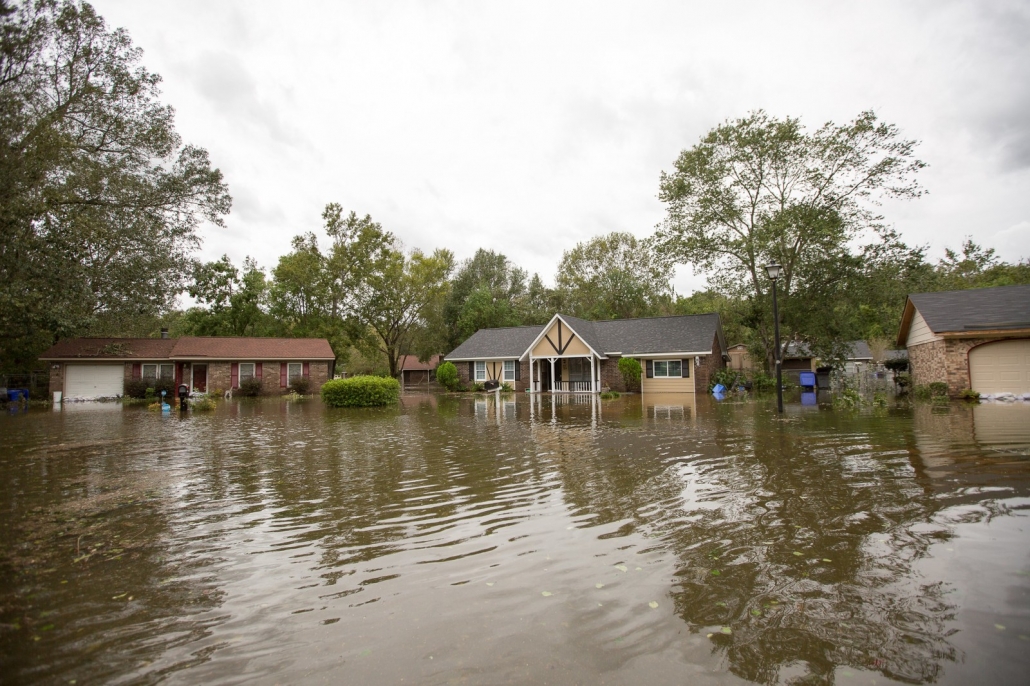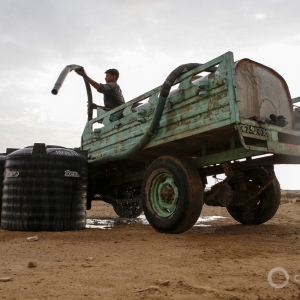The Stream, March 9, 2022: A New Study Reveals the Disproportionate Impact of Climate Disasters on People of Color in North Carolina

Hurricane Matthew in early October, 2016. Photo © Ryan Johnson/North Charleston on Flickr
YOUR GLOBAL RUNDOWN
- Pakistan and India meet for annual water sharing discussions.
- Communities of color in North Carolina faced higher risk of gastrointestinal illness after two major hurricanes, a study found.
- Nearly all schools in one New Jersey county tested positive for lead in drinking water supplies, data reveals.
The British government orders water companies to create contingency plans in the case of water shortages.
“We are river people, we are water people. Taking our water away from us depletes us. We can’t survive without it.” – Brendan Kennedy, a Tati Tati traditional owner. Traditional owners, or Indigenous Australian people living on tribal lands, in northern Victoria will receive 1.26 gigalitres (332.8 billion gallons) of water from state government as part of a massive water infrastructure project. Indigenous leaders like Kennedy say the allocation will only water one wetland in the area. Indigenous groups across the region have spent lifetimes battling state governments for water allocations in Australia. Grant Rigney, a leader from the Ngarrindjeri tribe, said the move was “an encouraging but long overdue initial step towards water justice for First Nations in the Murray-Darling Basin.”
In Recent Water News
What’s Up With Water—March 8, 2022 – This week’s episode covers disrupted water supplies in Ukraine and historic flooding in Australia. Plus, Circle of Blue highlights a recent report from the United Nations climate panel.
Pakistan Hosts Annual Water Discussions With India
Pakistan hosted the 117th India-Pakistan Permanent Indus Commission (PIC), an annual discussion of water issues, last week. Officials from both countries discussed a myriad of water-related issues, including Pakistan’s worries around hydroelectric projects in India. Past concerns from Pakistani representatives over hydropower production in disputed border areas remained unresolved, according to official records of the meeting.
This Week’s Top Water Stories, Told In Numbers
11 PERCENT
A recent study found that communities of color in North Carolina faced higher risk of gastrointestinal illnesses after Hurricanes Matthew and Florence in 2016 and 2018. The study looked at emergency room records, analyzing differing visitation rates between demographic groups. The study’s lead author said the findings were “concerning,” given that Black and American Indian communities have often been forced to live in flood-prone areas.
In Context: For towns like Fair Bluff, North Carolina, the storms overwhelmed aging sewer systems, sending the community into financial ruin. Flooding left the town, its sewer system, and its residents with a losing equation, Kim Colson, director of the North Carolina Division of Water Infrastructure, told Circle of Blue in 2019.
92 PERCENT
A joint study from the Environment New Jersey Research & Policy Center and the Black Church Center for Justice and Equality found that 92 percent of schools in New Jersey’s Atlantic County tested positive for lead in their water and one or more taps. The organizations obtained testing data for almost every school in the country from the state’s Education Department. Data for six schools was not publicly available. Parents, educators, and community members expressed dismay and outrage at the findings. Khalee Shabazz, vice president of the Atlantic City County, said, “Everyone is concerned about the future of our young people [and] the wellbeing of our young people.”
On the Radar
Water companies in the United Kingdom have been tasked with creating new contingency plans for water treatment and sharing supplies in the event of a “civil emergency” as war continues between Ukraine and Russia. UK officials say the move has been long-planned and conflict in Ukraine was coincidence, and stressed that there was no need for households to begin stockpiling water. Last year, the federal government identified the country’s reliance on Russia for drinking water and wastewater treatments as “critical,” and has since lessened its dependency on the nation.
More Water News
The latest IPCC report from the United Nations climate panel detailed heightened risks for women and girls due to climate change, especially pregnant women. The report also found that Europe will continue to endure worsening agricultural losses and water scarcity as the world’s temperature rises.
A study from the U.S. Environmental Protection Agency found that water filters are reducing lead in drinking water supplies in the Michigan city of Benton Harbor. The city’s drinking water exceeded federal limits for lead for three years before state and federal officials acted, which has left many residents mistrusting of the EPA’s study.
Russian attacks have left over 900 Ukrainian communities without water supplies, heat, and electricity, according to Ukrainian presidential adviser Mykhailo Podolyak.
Jane is a Communications Associate for Circle of Blue. She writes The Stream and has covered domestic and international water issues for Circle of Blue. She is a recent graduate of Grand Valley State University, where she studied Multimedia Journalism and Women, Gender and Sexuality Studies. During her time at Grand Valley, she was the host of the Community Service Learning Center podcast Be the Change. Currently based in Grand Rapids, Michigan, Jane enjoys listening to music, reading and spending time outdoors.







Leave a Reply
Want to join the discussion?Feel free to contribute!